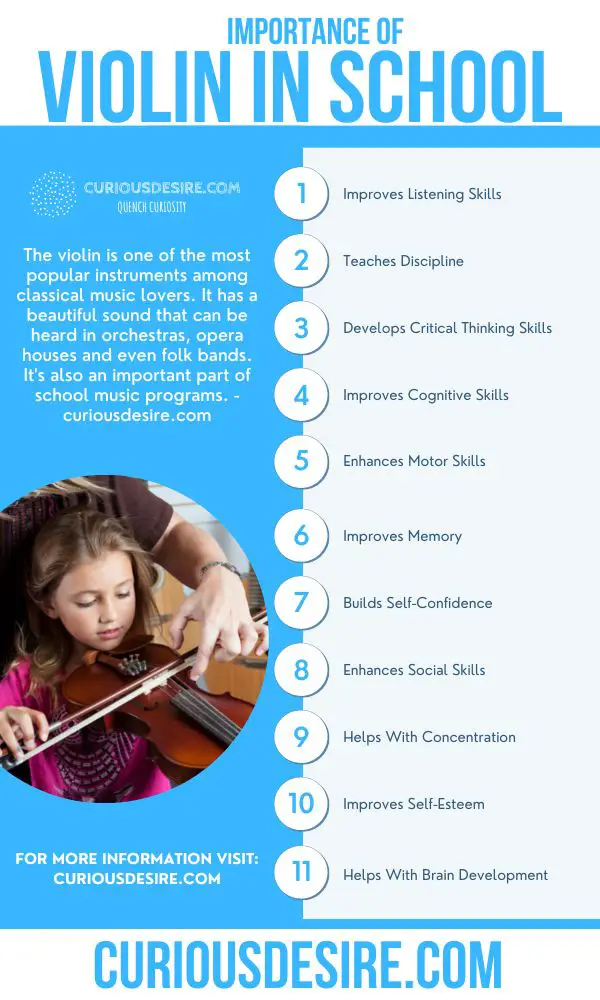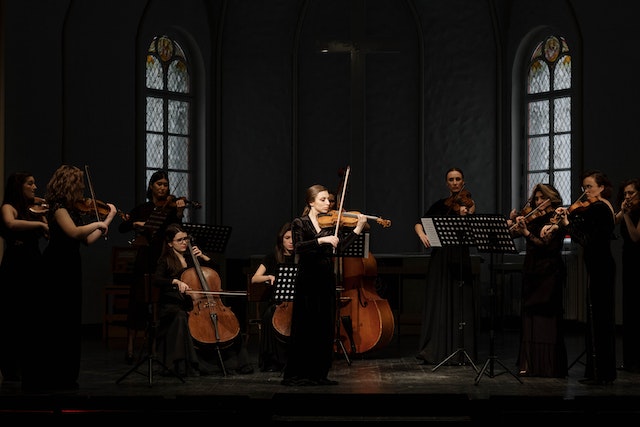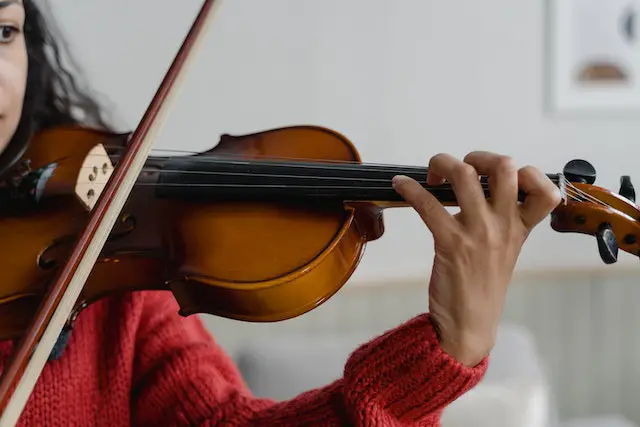The violin is one of the most popular instruments among classical music lovers. It has a beautiful sound that can be heard in orchestras, opera houses and even folk bands. It’s also an important part of school music programs.
It teaches children how to work together and encourages creativity. In this article, we’ll take a look at 15 reasons why violin is important in school.
15 Benefits of Violin in School
The violin is a great way to introduce kids to classical music and the culture of their community. It also helps develop fine motor skills, aural awareness, musicality, and cognitive thinking. Here are some other benefits of learning the violin in school:
1. Violin in School Improves Listening Skills
Learning to play the violin requires careful listening, so kids can develop better auditory skills while they’re playing. With better listening skills, they can also pick up on more subtle nuances when playing music.
Through playing the violin, kids can also learn to understand what other musicians are playing. This allows for collaborative music-making and a deeper understanding of different musical styles.

2. Violin Teaches Discipline
The violin is an instrument that requires practice and dedication to master. Kids must be diligent in their practicing if they want to excel at it, teaching them the importance of self-discipline. With this practice, they can also learn patience and gain a greater appreciation for music.
For instance, they must learn how to play the same piece accurately and with precision, no matter how hard it is. This encourages them to pay attention to detail and work hard on perfecting their playing.
3. Violin Develops Critical Thinking Skills
To play the violin proficiently requires intense, devoted concentration. Kids must analyze each note and determine if they’re playing it correctly. This encourages them to use critical thinking and hone their problem-solving skills.
Additionally, kids must also learn how to interpret the music in order to play it effectively. This requires them to use abstract thinking, which helps them become better thinkers and better musicians.
4. Violin Improves Cognitive Skills
The violin is an incredibly complex instrument. It requires a high level of coordination between the hands and fingers, as well as mental agility. As kids practice, they’re also honing their cognitive skills and improving memory retention.
In addition, playing the violin can help reduce stress levels and improve concentration. This means that kids will be able to focus more on their studies and retain knowledge better than if they weren’t playing an instrument.
5. Violin Enhances Motor Skills
Playing the violin requires precise movements of the hands and arms. Kids must learn how to move their fingers quickly and accurately in order to play certain notes. This helps them develop better motor skills, which are essential for performing everyday tasks such as writing and typing.
It also helps kids become more aware of their bodies and how they move, which can help them with physical activities like sports.
Suggested Readings
Why violin is important in music?
Why violin is important in society?
6. Violin Improves Memory
Mastering the art of violin playing not only heightens musical aptitude but also enhances memory capacity through memorizing complex tunes. Kids must learn how to remember notes and rhythms in order to play them correctly and accurately.
This enhances their overall memory, which can be beneficial in other areas of life. It also helps them become better problem-solvers and creative thinkers.

7. Violin Builds Self-Confidence
When children play the violin, they gain a sense of achievement that uplifts their self-esteem. As they master more complex pieces, their pride in themselves will grow, and it will be reflected in other areas of their life.
It can also be an incredibly powerful form of self-expression, allowing kids to express their emotions through music. This can help them become more confident in who they are and what they’re capable of achieving.
8. Violin Enhances Social Skills
Playing the violin can help kids become more aware of their role in a musical ensemble. This allows them to develop social skills such as communication, collaboration, and compromise with other musicians.
It also teaches them how to be better listeners, which is beneficial when playing in an ensemble or attending music classes. Playing music with others can also help create friendships and foster a sense of community.
9. Violin Helps With Concentration
Concentrating on music helps kids stay focused in school and can even help with test-taking. When they learn to practice something that requires a lot of concentration, they can transfer this skill to other areas of their life.
Playing the violin also increases a child’s attention span, which can help them stay focused longer in class and when completing homework. This improved concentration can lead to better performance in school and better grades overall.
10. Violin Improves Self-Esteem
When young people learn to play the violin, they find a new source of pride and self-confidence. It helps them build confidence in their abilities and teaches them to take pride in things that they have accomplished. This can help give them a sense of self-worth and can motivate them to reach new heights.
It also encourages kids to try something outside of their comfort zone, which can expand their horizons and open up new opportunities. This improved self-esteem can help them in all aspects of life.
Suggested Readings
Why violin is important in the world?
Why violin is important in the workplace?
11. Violin Relieves Stress
Plucking the strings of a violin offers an ideal way to ease feelings of stress and tension. Music has been known to have calming effects that help reduce feelings of tension and worry.
It also helps kids take their minds off stressful situations, allowing them to relax and focus on something positive. This is especially important during difficult times such as exams or other challenges.

12. Violin Helps With Brain Development
Playing the violin is not only beneficial to a child’s physical development, but it also helps with their cognitive growth. It encourages them to use both sides of the brain, which helps develop problem-solving skills and analytical thinking.
It also helps boost creativity and encourages kids to develop their own unique style of playing. This improved brain development will help them in all areas of life, from academics to the workplace.
13. Violin Teaches Patience
To master the art of playing the violin, one must have an abundance of patience and unwavering dedication. Kids need to practice regularly in order to make progress and master more complicated pieces. This teaches them the importance of hard work and dedication, which can be applied to other areas of their life.
It also helps them become better at problem-solving, allowing them to take their time and think
Playing the violin requires patience because it often takes a while to get the sound just right.

14. Violin Teaches Teamwork
When children play the violin with a group, they learn how to collaborate and appreciate each other’s strengths and areas of improvement. This teaches them the importance of cooperation and collaboration, which can help them in group settings both inside and outside of school.
It also encourages kids to become better communicators, as they must be able to effectively communicate their ideas in order to make successful music. This skill can be beneficial when working with others or tackling challenging tasks.
Suggested Readings
Why violin is important in a relationship?
Why violin is important for a child?
Why violin is important for the brain?
15. Violin Builds Self-Discipline
To master the violin, takes a significant amount of devotion and self-control. Kids must practice regularly in order to get better, which teaches them valuable lessons about commitment and perseverance.
This can help them build self-discipline and increase their focus, which in turn helps with school work and other activities. As kids get better at the violin, they will also become more confident in their abilities, allowing them to take on new challenges with ease.
Conclusion
Learning to play the violin unlocks a world of possibilities for children, regardless of their age. It helps develop fine motor skills, boosts attention span and self-esteem, relieves stress and anxiety, enhances cognitive growth, teaches patience and teamwork, and builds self-discipline.
Not only does playing the violin provide a creative outlet for children to express themselves, but it also encourages them to set goals, work hard, and take pride in their accomplishments. With so many benefits, it’s no wonder that kids around the world are picking up the violin each day.
Overall, playing the violin can be a great way for children to learn invaluable skills that will benefit them throughout their lives. So go ahead and get your kids started today. They’ll be sure to thank you for it in the future.
Relevant Articles
Why violin is important in music?
Why violin is important in society?
Why violin is important in the world?
Why violin is important in the workplace?
Why violin is important in a relationship?